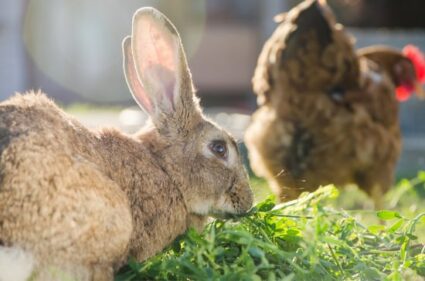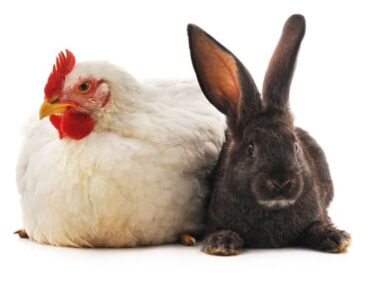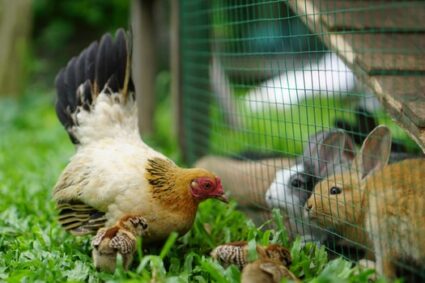Rabbits and chickens have a lot in common. They’re both predominately outdoor pets, and they’re both social, preferring company at all times. They both need hutches and runs to flourish. As a result, farmers and families consider housing them together to save on space.
Rabbits and chickens can share a hutch if they’re introduced while young. Ensure that the rabbits have a private hutch for sleeping. You’ll also need to muck out the coop regularly as rabbits are cleaner than chickens. They’re unlikely to fight and can become firm friends.
Precautions must be taken. The coop needs to be of substantial size, and you’ll also need to mindful of health concerns. Chickens carry diseases with no symptoms, which can make rabbits sick.
Is Keeping Chickens and Rabbits Together a Good Idea?
With the right care, you can create a harmonious multi-species home. But you can’t put a pair of rabbits into a chicken coop and hope for the best. Chickens and rabbits are delicate and fearful, animals. They need time to get to know each other, and they have different needs.
With time and dedication, keeping chickens and rabbits together can work. All animals are capable of forging unlikely friendships. Despite this, some ground rules must be observed. Chickens and rabbits will only tolerate each other’s company under certain circumstances:
- Introduce them when young. As both species grow older, they’ll become set in their ways and increasingly intolerant.
- Rabbits must be spayed or neutered: Male rabbits will mount anything in sight. This may be sexual in nature, or it could be an act of domination. Either way, neutering will calm them down.
- Clean environment: Rabbits are cleaner than chickens. They’ll grow distressed if they’re surrounded by filth. It is also a health hazard.
- Space and privacy: They’ll become overwhelmed if they feel they don’t have privacy.
- Sleeping quarters: You may want to include a hutch for your rabbit in the coop. Not only will they feel safer, but they’ll be cleaner. Chickens poop constantly.
- Two of each animal: One chicken and one rabbit will make both of them feel stressed and lonely.
- Behavior: If the relationship starts breaking down, separate the animals at once to avoid aggression.
What Are The Advantages of Chickens and Rabbits Living Together?
There is a range of benefits to keeping chickens and rabbits in the same coop. These include the following:
- Space-saving: One large coop for all your animals is more space-efficient than each type of animal living in separate homes.
- Company: If you can’t keep your rabbit indoors, chickens will keep them company. You’ll be surprised at how well these animals get along, provided that they’re introduced early enough.
- Security: Chickens and rabbits are prey species, and even attract the same predators. They’ll enjoy more safety in numbers.
- Reduced Smell: Rabbits are clean, but their waste has a pungent aroma. Chickens less so, so you’ll need to clean the coop regularly. This means that your rabbit will live in more sanitary conditions.
- Temperatures: Rabbits and chickens are hardy and cope well with cool weather. They both flourish in the winter. There’s no need to worry about one species needing more heat than the other.
- Fun: Chickens and rabbits are amusing to watch as they interact.
There are several reasons to keep these animals together. Of course, there are also disadvantages that must be taken into consideration.
What Are The Disadvantages of Chickens and Rabbits Living Together?
If we’re to be realistic, chickens and rabbits were not meant to live together. If this were the case, they’d be found in the same wild locations. Things to think about before forcing these animals to share space include:
- Food. Rabbits and chickens have different nutritional needs. If they eat each other’s meals, they may become sick. You’d need to feed rabbits separately. This is important, as chickens eat anything.
- Temperaments. Rabbits and chickens are as different as apples and oranges. Chickens are afraid of fast-moving animals, which may result in pecking, clawing, and fighting.
- Disease. Between them, rabbits and chickens can be prone to a range of zoonotic diseases. They could also share parasites. One unpleasant outbreak could wipe out your entire animal family.
- Cleanliness. This is both a pro and a con. Rabbits are much cleaner than chickens. This means you’ll need to muck out the coop daily. This reduces the risk of flies and parasites, but it’s hard work.
- Mating. A male rabbit may mount every chick in the coop. Neutering will help, but it may not stop the behavior altogether.
- Coop Materials. Rabbits have delicate skin and may hurt themselves on a wire chicken coop. Use suitable materials for both species.
- Digging. Rabbits love to dig, so you’ll need hard floors to prevent escape. This flooring can be uncomfortable for the chicken’s feet.

Size of a Rabbit and Chicken Coop Combo
The coop will need enough space to meet the needs of both species. Also, rabbits and chickens will need separate zones. Even if they manage to get along well, they’ll still need space from each other.
Start by thinking about the needs of your chickens. A coop must allow 3 square feet per chicken and 10 square feet per chicken in a run. Then, consider your rabbits’ needs. According to The Rabbit House, 12 square feet is advisable. They should have a run of at least 31 square feet.
This means that a shared living space needs to accommodate a rabbit. You may get away with a coop of 12 square feet, but go bigger if possible. If you can, aim for a minimum of 32 square feet.
Investigate farm suppliers, or if necessary, commission somebody to build your bespoke coop. It’s better than cramming rabbits and chickens into a space too small for their needs.
What is a Rabbit and Chicken Coop Combo Made from?
The materials used for a shared coop are as follows:
- The roof must be robust and waterproof.
- You must prevent rabbits from digging or they’ll create an escape route. The floor can’t be made of wire, though. This will hurt the feet.
- The coop must be secure as chickens are rabbits attract predators. Don’t use a solid front cover as this will prevent ventilation, and don’t use wire that will hurt a curious rabbit.
If you’re commissioning the creation of a bespoke coop, follow the specs of a rabbit hutch. You can’t go wrong with solid wood and good foundations.
Ideal Ratio of Rabbits And Chickens Living Together
Both chickens and rabbits like to live with their own kind. So, you should have at least two of each species in your coop.
However, one rabbit may accept living with two or more chickens if introduced to the coop as a baby. The chickens will take the rabbit in as one of their own. The rabbit will happier with a second rabbit, though.
Never keep just one chicken with a family of rabbits. It’ll soon feel overwhelmed and stressed by the experience.

How to Introduce Rabbits and Chickens
If you want rabbits and chickens to live in harmony, they must meet each other while young. Wait until a male rabbit is old enough to be neutered before making the introductions. Not only will it go some way to curbing amorous instincts, but it calms rabbits down.
You can’t just lock them together and tell them to get along. Use the following step-by-step process:
- Introduce both species on different sides of a fence. Let them get a feel for each other from a distance.
- Allow them to run free together. They may ignore each other at first, but this means they do not feel threatened.
- Let the chickens have the run of the coop and place the rabbits in the run. After a while, reverse these roles. Eventually, the two species will grow used to sharing a space together.
- Watch out for territoriality in the rabbits as they will jealously guard their space. Ensure they understand that the coop is a shared space. Providing a unique, rabbit-only retreat will help with this process.
Are My Rabbits and Chickens Getting Along?
Rabbits and chickens are far from shy about announcing their feelings. Fur and feathers will fly if the two species cannot peacefully co-exist.
Despite this, you’ll also need to check for warning signs. Stress and anxiety can make animals sick. Warning signs to look out for include:
- Withdrawing from the group at large
- Excessive grooming of barbering. This would involve the rabbit or chicken tugging out its own fur or feathers
- Uncharacteristic aggression toward humans from a placid animal
- Lethargy and depression
- One species is chasing members of the other species
If you spot these behaviors, separate them for a while. If the problems persist after re-introducing the animal, it’s time for separate enclosures.
Do Rabbits Attack Chickens?
Rabbits are small animals with big hearts. This means that, if they feel threatened, they may attack chickens. This can be a dangerous situation. If a rabbit is annoyed, it can be surprisingly vicious. Rabbits are also territorial. They may become antagonistic if they feel a chicken is encroaching on ‘their’ land.
This is why it’s so important to introduce animals when they’re young. The rabbit is more likely to accept sharing their space this way. Warning signs that a rabbit is planning an attack include:
- The thumping of the back foot
- Ears tucked back and flat against the body
- Standing on the hind legs and adopting a boxer’s stance
- Growling and grunting
If you spot these behaviors, remove the rabbit from the coop for a time out. Act quickly. The less a rabbit feels like their cues are being acknowledged, the angrier they’ll become.
You may also need to watch out for a rabbit chasing chickens, too. This can be tricky as rabbits chase through play. On other occasions, they’re planning to tear out the chicken’s feathers.
Let the rabbit chase once, and see what it does. If it pulls away at the last moment, it’s just a game. Chickens can be nimble, and they may all being enjoying themselves. At the first sign of teeth/claws, separate the animals.
Would a Rabbit Damage a Chicken’s Eggs?
In theory, a rabbit will be indifferent to a chicken’s eggs. Rabbits are herbivores and do not have any reason to think eggs will taste good.
Despite this, remember that rabbits are also curious. They may wonder what this strange thing in their house is. This will inspire them to investigate. They’ll sniff, nudge, and may even break the eggshell.
Chickens are protective of their eggs, so a rabbit messing with them may lead to conflict. It’s not just the hen that laid the eggs, either. Chickens take turns in keeping the eggs warm. A rabbit may learn this the hard way.

Do Chickens Attack Rabbits?
Chickens are not crazy about animals that move quickly. This can be an issue at first as rabbits love to run. It may result in some growing pains when the two species first share a space.
What’s likely to happen is a peck from the chicken to the passing rabbit. All being well, the rabbit won’t notice. It certainly shouldn’t hurt it. After a while, the chicken will stop this behavior.
Chickens will devour anything they get their beaks on, and this could include baby rabbits. Never breed rabbits in a communal coop as it’s not safe for the rabbit offspring.
Do Rabbits and Chickens Share Diseases?
Usually, these are transmitted from chicken to rabbit. Chicken poop, in particular, is a constant health risk for rabbits.
The other concern is shared parasites. Flea infestations are not common in chickens, but they can occur. Ticks are less of a concern. These arachnids rarely attach to chickens. In fact, chickens actively eat them.
Can Chickens Give Rabbits Diseases?
Salmonella is a disease that many chickens have, but display no symptoms. This means that the chickens could infect a rabbit without even realizing. Not all rabbits show symptoms of the disease, though.
Of greater concern is the risk of coccidiosis. This disease occurs when a parasite attaches itself to a chicken’s digestive tract. If shared, this disease can be fatal to chickens and rabbits.
Can Rabbits Get Coccidiosis from Chickens?
It can be passed on by rabbits eating chicken feces. The disease lives in the intestine of chickens. This means it’s also present in their waste.
As rabbits eat their own poop, they may eat chicken poop. What’s more likely is that the parasite will be present in hay or shared water. The rabbit will then consume it unwittingly.
Chickens must not roost above a rabbit’s sleeping quarters. The risk of coccidiosis is the most compelling argument.
Preventing Coccidiosis in Rabbits
You need to step up the hygiene of your shared coop. Coccidiosis is found in chicken poop, so you need to keep your rabbit away from it.
If you keep rabbits alone, you can clean its hutch once a week. If you keep chickens alone, a deep clean is needed infrequently. Keeping the animals together means that you’ll need to clear their space regularly.
If the coccidiosis is caught early, the rabbit will likely make a full recovery. Medication and lifestyle changes will work.
Can Rabbits Give Chickens Diseases?
Pasteurellosis in rabbits is better known as snuffles. It’s a bacterial infection of the upper respiratory tract. Snuffles is contagious between rabbits. It can be life-threatening if the rabbit has a weak immune system.
Pasteurellosis can be a severe concern for chickens as it can lead to fowl cholera. This is frequently fatal. Vaccination for chickens is available, and advisable, if you wish to keep two different species of animals together.
In the meantime, it’s best to separate any rabbit with snuffles from your chickens. Have a spare hutch handy, and let the rabbit recover before it rejoins the group. It’s the only way to prevent its spread.
Can Chickens Catch Myxomatosis?
Myxomatosis, the rabbit-killing virus, will not affect them. This condition is unique to rabbits, and is also rare in the United States. Thankfully, few domestic rabbits are diagnosed.
If one rabbit in a coop develops myxomatosis, it will spread like wildfire. Expect all bunnies that live together to be affected in short order. The most likely way of a rabbit contracting myxomatosis is through flea bites.
A bug carrying the disease may feed on a chicken and cause no ill effects as poultry are immune. If the same flea or tick then bites a rabbit, the virus will not die off and will cause infection.
Rabbits and chickens can live together happily. In the right circumstances, they won’t just survive, they’ll thrive. Despite being wholly different species of animals, they’ll often find common ground.


Thanks so much for the informative blog post. We’re considering keeping chickens and rabbits together and the above provided a lot of information as well as things to consider while we design and build our coop.
We had been planning to have rescue chickens – here in the UK, it’s quite common to do this as hens from egg farms are surplus to requirements at about 18 months old or so. Many of them are rescued and see out their days with a slower laying rate in peoples gardens. But would this be young enough for introducing them to rabbits? We’ve not yet considered where to get our rabbits from, but likely another rescue situation.
Thanks